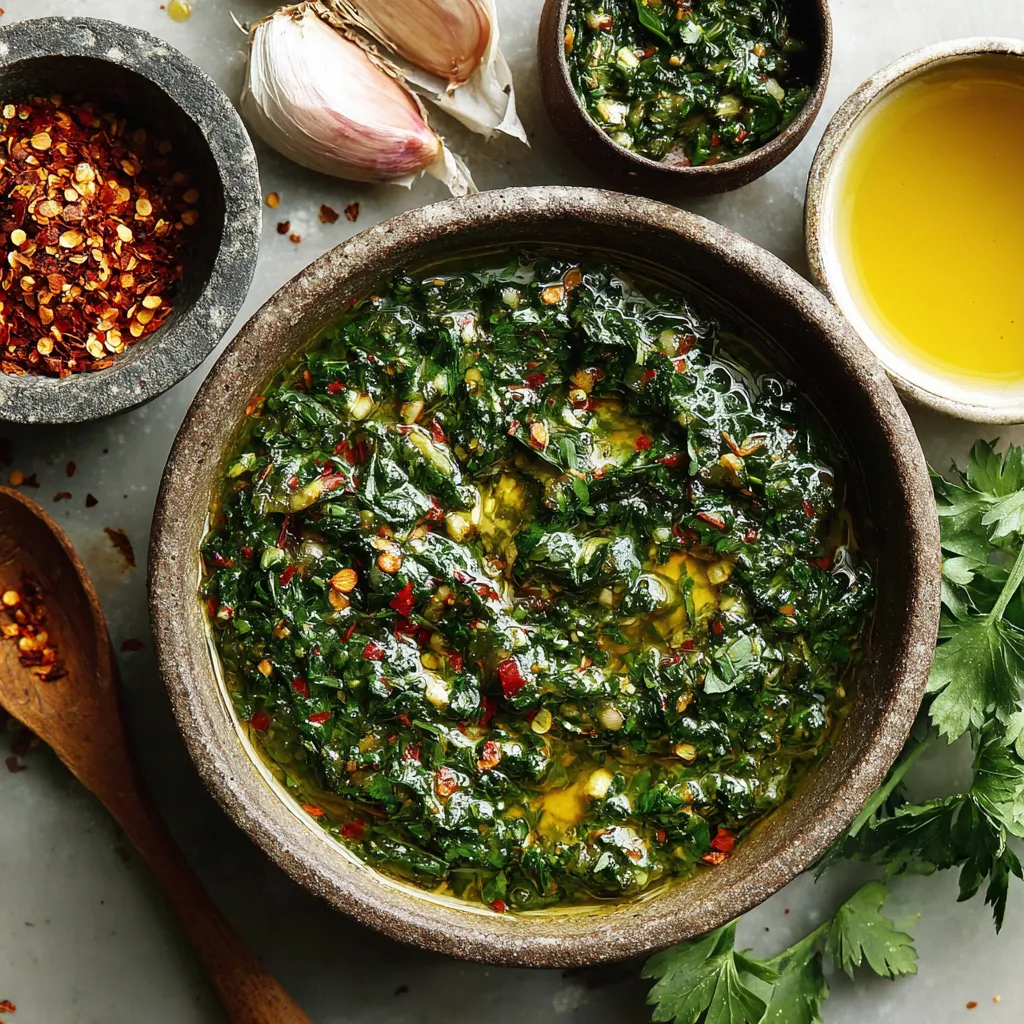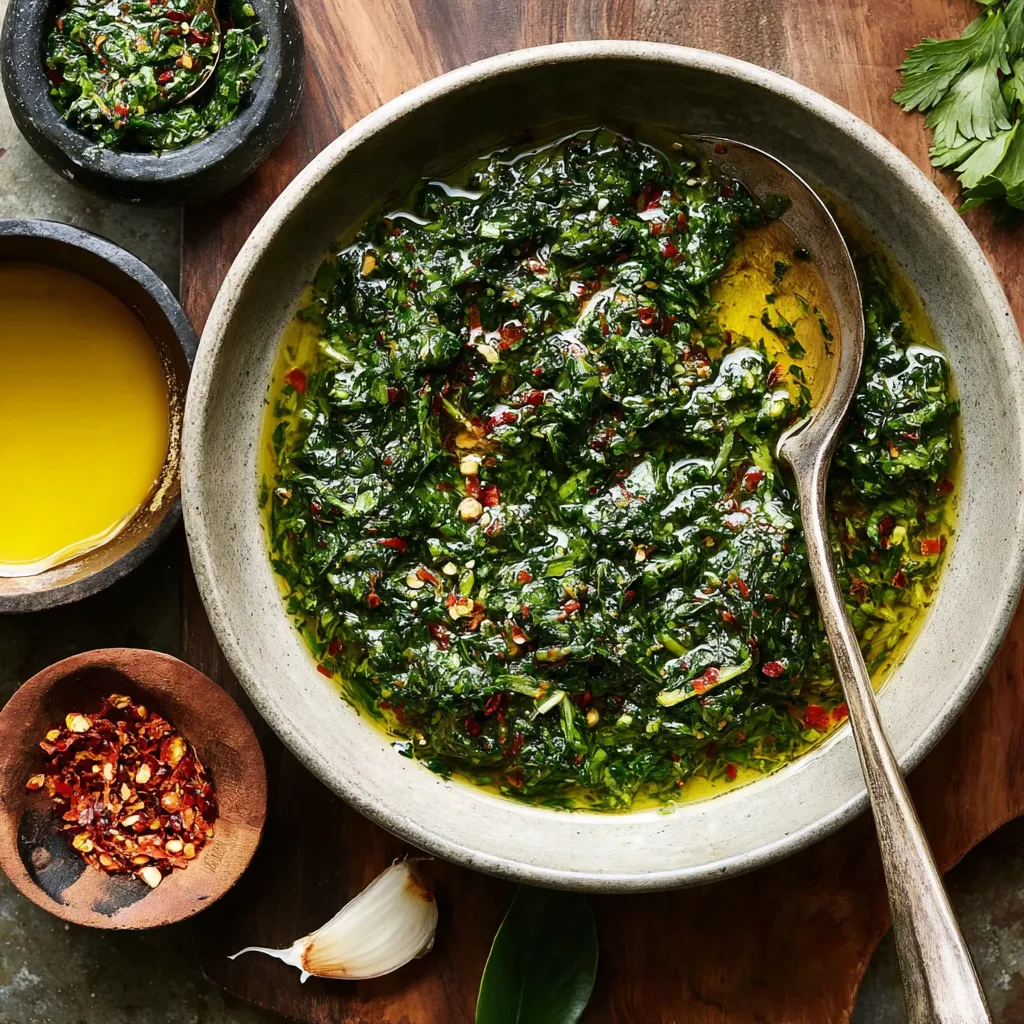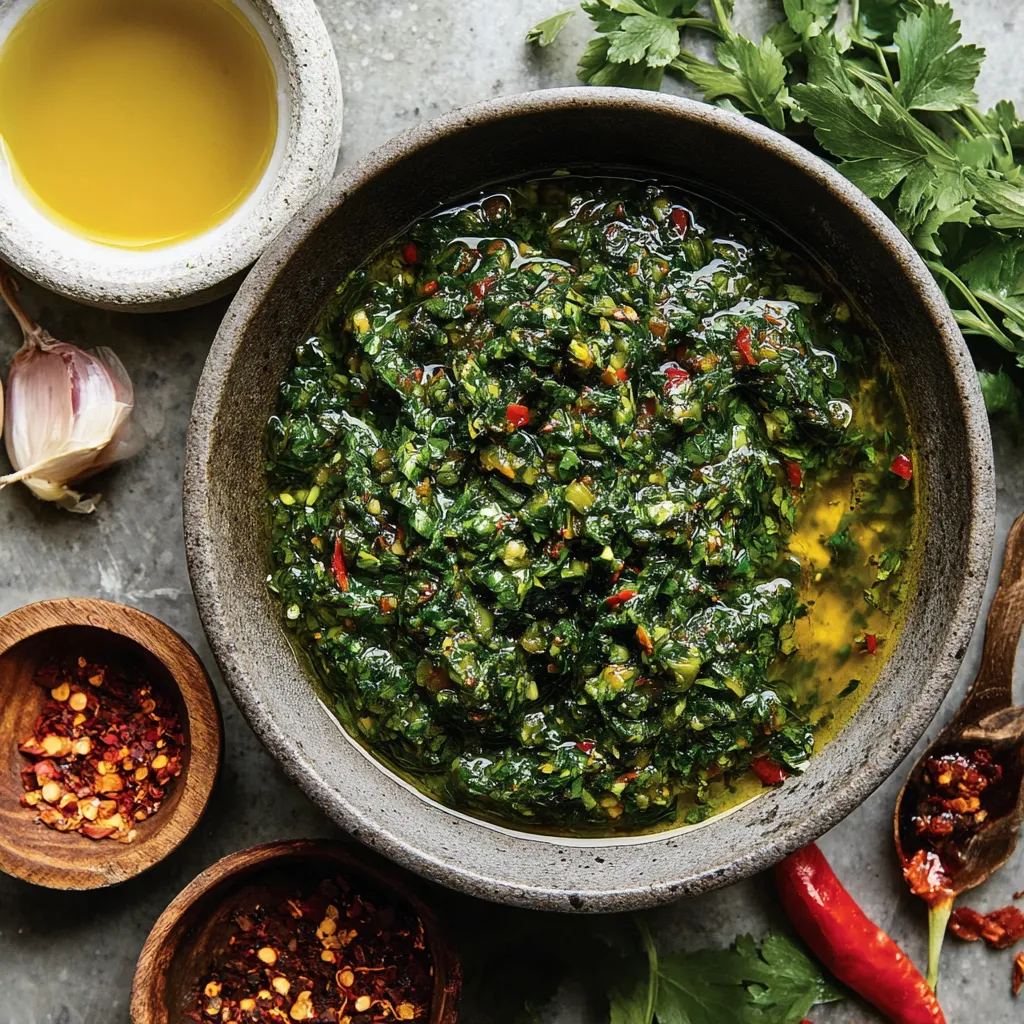 Save
Save
This bright, tangy chimichurri sauce transforms ordinary meals into extraordinary culinary experiences. With its vibrant green color and bold flavors, this Argentinian classic has become my go-to sauce for elevating everything from grilled meats to roasted vegetables.
I first discovered chimichurri while traveling through Argentina and was instantly captivated by its perfect balance of herbs, garlic, and acidity. After numerous attempts to recreate that authentic flavor, this recipe finally captured the essence I remembered from those roadside parillas.
Ingredients
- Fresh parsley Creates the vibrant green base and provides earthy freshness. Look for bunches with bright green leaves and no wilting.
- Extra virgin olive oil The foundation that carries all flavors. Choose a good quality oil with a fruity undertone.
- White wine vinegar Provides essential acidity. Apple cider vinegar works in a pinch but white wine vinegar offers cleaner flavor.
- Fresh garlic Delivers pungent depth. Always use fresh rather than pre-minced for optimal flavor.
- Sea salt Enhances all other ingredients. Flaky sea salt dissolves beautifully in this sauce.
- Dried oregano Adds subtle herbal notes. Mediterranean oregano works best here.
- Red pepper flakes Brings gentle heat that builds. Adjust according to your spice preference.
- Smoked paprika Contributes subtle smokiness. Spanish varieties offer the most authentic flavor.
Step-by-Step Instructions
- Create the Base
- Combine olive oil, vinegar, minced garlic, salt, oregano, red pepper flakes and smoked paprika in a bowl. Whisk thoroughly until ingredients begin to emulsify. The oil and vinegar should start to combine rather than separate. This base creates the perfect environment for the herbs to release their flavors.
- Add Fresh Herbs
- Gently fold the finely chopped parsley into the liquid base. Stir with intention, making sure every bit of parsley gets coated with the oil mixture. This allows the oils to draw out the aromatic compounds from the herbs. The mixture should look vibrant green and well incorporated.
- Alternative Blending Method
- If you prefer a more uniform texture, combine all ingredients in a food processor or mortar and pestle. Pulse briefly just until ingredients come together but still maintain some texture. Overmixing can cause bitterness from the herbs, so proceed with care. The mortar and pestle method creates the most authentic texture and flavor by bruising rather than cutting the herbs.
- Taste and Adjust
- Season with additional salt, vinegar, or red pepper flakes as needed. The flavors should be bold and balanced with no single ingredient dominating. Let it sit for 5 minutes before final adjustments as the flavors will meld and develop.
 Save
Save
The parsley is truly the heart of this sauce. I source mine from local farmers markets whenever possible, as the flavor intensity of freshly harvested herbs makes a remarkable difference. My family now judges the quality of a steakhouse primarily by the authenticity of their chimichurri!
Storage Solutions
Chimichurri maintains its vibrant flavor for about a week when stored in an airtight container in the refrigerator. The olive oil may solidify slightly when cold but will quickly return to liquid form at room temperature. For longer storage, freeze the sauce in ice cube trays, then transfer the frozen cubes to a freezer bag. This method preserves the bright flavors for up to three months and allows you to thaw only what you need.
Beyond Steak
While traditionally paired with grilled meats, chimichurri's versatility extends far beyond. Try it drizzled over roasted vegetables, stirred into scrambled eggs, or tossed with warm potatoes for an instant flavor upgrade. It makes an exceptional sandwich spread or can be stirred into rice for a quick green rice side dish. I particularly love it spooned over avocado toast or mixed with Greek yogurt for a tangy dip.
Cultural Context
Chimichurri originated in Argentina, where it remains a staple condiment for their famous asado barbecues. Legend suggests the name derived from Jimmy McCurry, an Irishman who supported the Argentine independence movement, though most food historians dispute this claim. Traditionally, Argentinian gauchos (cowboys) carried dried herbs and spices to make this sauce in the field. Regional variations exist throughout Argentina and neighboring Uruguay, with some versions including cilantro or mint alongside the parsley.
 Save
Save
Recipe FAQs
- → What is traditional chimichurri sauce used for?
Traditional chimichurri sauce is primarily used as a condiment for grilled meats in Argentinian cuisine, particularly with beef and steak. However, it's incredibly versatile and works beautifully as a marinade, a drizzle for roasted vegetables, a spread for sandwiches, a dressing for grain bowls, or a dipping sauce for bread.
- → How long does homemade chimichurri last in the refrigerator?
Homemade chimichurri sauce typically lasts 1-2 weeks when stored in an airtight container in the refrigerator. The olive oil and vinegar act as natural preservatives. For longer storage, freeze it in ice cube trays as mentioned in the notes.
- → Can I use dried herbs instead of fresh parsley?
While chimichurri is traditionally made with fresh herbs, you can substitute dried parsley in a pinch. Use about 3 tablespoons of dried parsley instead of the 1/2 cup fresh, but be aware that the flavor profile will be noticeably different. The vibrant, bright quality that makes chimichurri special comes from fresh herbs.
- → Why is a mortar and pestle recommended for making chimichurri?
A mortar and pestle is recommended because the grinding action helps release the essential oils from the herbs and garlic, creating a more aromatic and flavorful sauce. This traditional method breaks down the cell walls of the ingredients more effectively than just chopping, resulting in better flavor integration and a slightly different texture than food processor versions.
- → Is chimichurri sauce spicy?
Chimichurri has a mild heat from the red pepper flakes. In this particular version, with 1/4 teaspoon of red pepper flakes, the spice level is relatively mild. You can easily adjust the heat by increasing or decreasing the amount of red pepper flakes according to your preference.
- → Can I customize the chimichurri with other herbs?
Absolutely! While traditional Argentinian chimichurri primarily features parsley, many variations include cilantro, oregano, or even mint. A common adaptation is to use half parsley and half cilantro for a different flavor profile. Feel free to experiment with herb combinations while maintaining the basic oil-vinegar-herb ratio.
